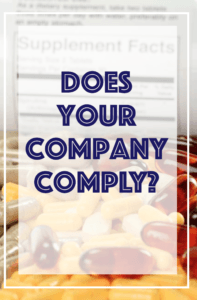
In the articles about the emerging Retail Super-highway and ‘Amazon effect on supplements’, Trust Transparency partner Scott Steinford and myself have written about the regulatory and fundamental quality responsibilities that all brand manufacturers, let alone online-only brands, needed to embrace. At that time, we pointed out that recent warning letters seemed to indicate these brands were either ignorant or taking short cuts, often assuming that their contract manufacturers had taken care of all regulatory concerns where, quite specifically, brands themselves cannot abdicate this responsibility. We’ll now pick up where we left off in this series, specifically capturing areas where these responsibilities are sometimes absent.
Building an SOP Manual
Introduction:
A requirement by the US FDA for dietary supplement GMPs under 21CFR 111, building an SOP manual would seem like a pretty daunting task. Yet in reality, even for full scope manufacturers, the guidelines are pretty well laid out. When you consider the limited operational aspects that brand holders have to consider, a medium difficulty task becomes rather simple.
Issue:
Standard Operating Procedures are required for any organization that manufactures, packages, labels or holds a dietary supplement. They are not required for companies that only manufacture or hold dietary ingredients, or companies that are involved in harvesting, distribution or storage of agricultural commodities for incorporation into dietary supplements. They are also not required for retailers that hold supplements for direct to consumer sales.
FDA offers the following table on GMP requirements:
| Table 3 Requirements for Written Procedures |
|
| Subpart | Written Procedures That the DS CGMP rule Requires You to Establish and Follow |
| B | Fulfilling the requirements for personnel (21 CFR 111.8) |
| C | Cleaning the physical plant and pest control (21 CFR 111.16) |
| D | Fulfilling the requirements for equipment and utensils, including calibrating instruments and controls you use in manufacturing or testing a component or dietary supplement; calibrating, inspecting, and checking automated, mechanical, and electronic equipment; and maintaining, cleaning, and sanitizing, as necessary, all equipment, utensils, and any other contact surfaces that are used to manufacture, package, label, or hold components or dietary supplements (21 CFR 111.25) |
| F | The responsibilities of quality control personnel, including written procedures for conducting a material review and making a disposition decision, and for approving or rejecting any reprocessing (21 CFR 111.103) |
| G | Fulfilling the requirements for components, packaging, and labels and for product that you receive for packaging or labeling as a dietary supplement (21 CFR 111.153) |
| J | Laboratory operations, including written procedures for the tests and examinations you conduct to determine whether specifications are met (21 CFR 111.303) |
| K | Manufacturing operations (21 CFR 111.353) |
| L | Packaging and labeling operations (21 CFR 111.403) |
| M | Holding and distributing operations (21 CFR 111.453) |
| N | Fulfilling the requirements for returned dietary supplements (21 CFR 111.503) |
| O | Fulfilling the requirements for product complaints (21 CFR 111.553) |
Many companies rely on contract manufacturers to make their products and never, in fact, actually take physical possession, as they can move directly from manufacture through to distribution on their way to consumers. FDA has been very clear that the company whose name is on the bottle needs to have the appropriate SOPs in place for operations relating to manufacturing, packaging, labeling and holding of dietary supplements. This means that SOPs covering all of the above are required, with the possible literal exception of C and D, except that your audit of your contract manufacturer should in fact include verification of their SOPs for the above, so in reality, all areas above should be covered in some form.
Relevance:
Failure to have appropriate Standard Operating Procedures was either the chief finding or major finding in the following warning letters after 483s.
Examples:
https://www.fda.gov/ICECI/EnforcementActions/WarningLetters/2017/ucm592683.htm
https://www.fda.gov/ICECI/EnforcementActions/WarningLetters/ucm606528.htm
https://www.fda.gov/ICECI/EnforcementActions/WarningLetters/ucm596320.htm
https://www.fda.gov/ICECI/EnforcementActions/WarningLetters/ucm600398.htm
https://www.fda.gov/ICECI/EnforcementActions/WarningLetters/ucm608714.htm
What you can do:
Ensuring someone in your organization (or a contractor) is trained and is thoroughly versed in 21 CFR 111 is also a requirement of the regulation. Choosing a GMP certified manufacturer (by NSF, Underwriter’s Lab, or Natural Products Association (NPA) is a great start, and securing this relationship with an appropriate contract, documented in SOPs is a good next step.
An excellent SOP template book is available from NSF: https://www.nsf.org/newsroom_pdf/preview_ds_sourcebook.pdf
Another SOP template is offered by the American Herbal Products Association:
http://www.ahpa.org/Resources/cGMPSOPTemplates.aspx
[ctct form=”1606″]






